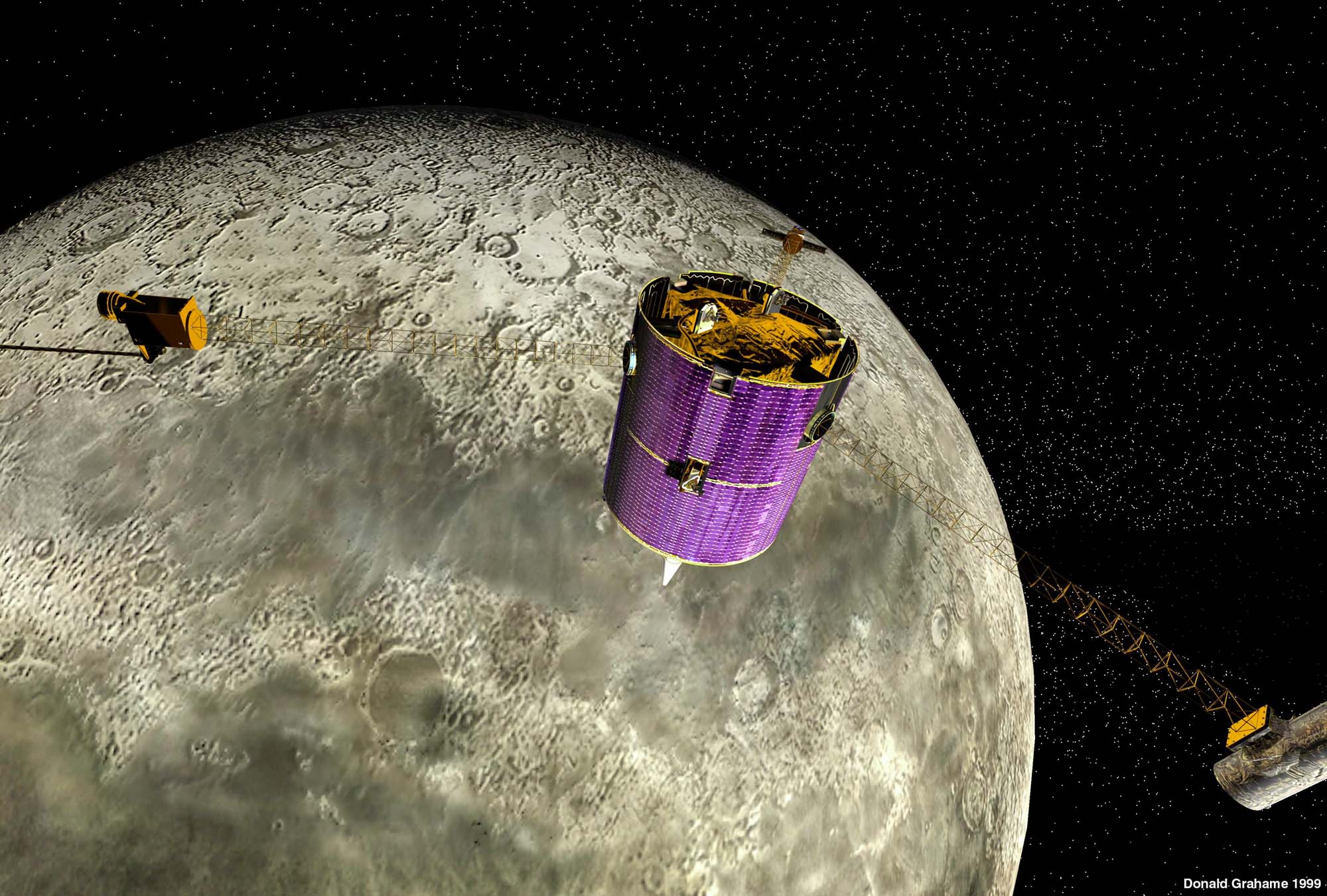By Julie Schonfeld
When I was 10 years old, I decided I was going to be the first woman astronaut. By the time I was 12, I knew what schools I was going to attend, what degrees I was going to get; basically, I had the whole thing figured out.
This is the way I’ve always been. I make a goal for myself and plan the best path to get there.
In high school, I was an intern at the Kennedy Space Center. I went on to be a pre-co-op and a co-op student at Kennedy too, and when I graduated I was offered a position at Ames Research Center in California.
Which is where I am now, still at NASA, the place I’ve always dreamed of working, and while I’m not an astronaut, I’m fine with that. Being a project manager has turned out to be wonderfully challenging, and I enjoy contributing to the Agency that way.
But this story is not so much about dreams as it is about the real world. A couple of years ago I was feeling restless. After 9 years at NASA as a project manager, I felt I had reached a point in my life where I needed a change. I took a leave of absence to find out what it was like to be a project manager in private industry. This was not an easy decision. All I ever wanted to do was work for NASA. In fact, it was absolutely heart wrenching for me to leave because I was thinking I might not come back.
My personal philosophy of project management is that you should place the highest value on the people doing the work, your team. I believe that the people doing the work know better than anyone what should be done in their individual areas, not management. I’ve seen cases where project managers and upper managers above them will decide something on a project despite the views of someone who has more knowledge about the issue in question. Letting the team know what the goal is and giving each individual a role in that and clearly defining what their responsibilities are and just letting them go — that’s what I try to do as a project manager. In general, I don’t find that to be the case. Too many managers are concerned with appearing to know more than anyone below them. I suppose this was the source of my dissatisfaction at NASA, and why I thought I needed a change. Was it like this everywhere? I needed to know.
The Big Leap
Through a process of elimination, I arrived at Cisco Systems. I knew they were doing really exciting work there, and clearly, they were a company that could produce. Everything that I’d read in the press about them said such marvelous things. And then it’s rated as one of the best companies to work for.
Now, what position I was looking for at first, I didn’t have a clue, but I knew I could offer pretty solid skills as a project manager, so I went with it. Define the goal, and then develop a plan that points in that direction.
It turned out there was an opening for a Project Manager in one of their Information Technology (IT) design groups. I applied and was hired straight away.
Initially it seemed like a nice fit, and I was quite pleased. One of my goals was to see why Cisco was talked about in such glowing terms. I wanted to find out if it was just hype or if Cisco really was different. So I set out to see if they “had the goods.”
Cisco has a different take on project management than I was used to at NASA. They do not assume that the project manager is necessarily the technical expert in her group. In this particular IT group that I was part of, I was partnered with a network architect, and we worked together as a team. It was a partnership in the true sense of the word. The network architect was responsible for the technical direction, and as the project manager I was responsible for managing the effort and being the interface to upper management and to other lines of business within the company. At the same time, I was not excluded from the technical side of the project, and I felt that my contributions there were welcome.
At Cisco, teams have more say than any one individual. Project teams can even overrule vice presidents. If a Vice President says you will do this, the project team can say, “Well, these are all the reasons why we think we shouldn’t go in that direction.” Naturally, you have to do more than just offer an opinion. You must build a case, but it is a real policy. I saw it in action several times.
The project that I was working on dealt with video conferencing, and they wanted to deploy a product immediately. We showed all of the problems that would occur if it were deployed too soon, and how it would prove to be unmanageable and unreliable. Because we could not guarantee service, we convinced them it was best to wait.
What impressed me about Cisco is that management focuses on enabling employees to succeed. That’s why their acquisitions of other companies are so successful. Within two weeks, all the employees of the acquired company have their benefits, salary packages, and computers. The beginning-to-end transition process is three months. These people are not suffering, wondering what is going to happen to them.
A major focus of the company is “What’s good for Cisco as a whole is what’s good for everyone.” That focus makes for a constructive work environment, and it’s within that environment that people remain enthusiastic about their jobs and hence maximize their productivity. That aspect of “the people element” is what I believe management should be about.
Straight Down
Now why did I return to NASA when it seems I had found my niche at Cisco? The reason that I left actually was because a situation developed that was incongruous with what the Cisco culture was supposed to be about, and I wasn’t sure that they were going to live up to their reputation.
The manager who had hired me thought our group was getting to be too large. He decided to break us up into three subgroups and was going to put a new layer of management between him and the group. We actually got to help hire this person, and in the interview he seemed fine. Well, he turned out to be someone who assumes that he knows more than anyone.
He didn’t respect anybody’s input. The whole team would say, “We think we should go here,” and he would say, “Well, that’s fine, but I think we need to go here, and so we’re going to do what I say.”
When I showed him a presentation, he told me what I needed to do technically and was clearly wrong, but wouldn’t listen to me when I tried to explain. I watched him publicly belittling someone, and additionally, performing strong-armed “corrective measures” with someone who was one of the best performers in our group. “You will be on my calendar every single day and I’m going to monitor your progress daily,” he told him.
One Friday at the end of the day, many of us who were disgruntled held this meeting to discuss the situation, how he was micromanaging this process that we were supposed to be developing, and what we should do. There were just a lot of hostile comments from everyone in the group and how this was totally incongruous to the way things were supposed to be done at Cisco.
We went to our original boss and said he’s being horrible. We expected him to be fired, or moved to somewhere else in the company at least, but this didn’t happen. Our original boss said, “I’m going to work with him, and we’ll see about improving this.”
A month later we weren’t seeing any improvements. I actually went to my original boss’s manager, and then I went to a Vice President, and I said, “There is a big problem. He’s horrible, we’re miserable, and our productivity is being affected.” I did this because John Chambers, Cisco’s CEO, says in his meetings, “We cannot afford to have bad managers. We cannot afford to lose good employees. If you have a manager who’s bad, you need to escalate it, you need to take it to your manager’s manager, and if they don’t address it, you take it higher.” When it was clear that my manager wasn’t going to take any action, I went higher.
A round this same time my leave of absence was about to come up. I had to either go back to NASA or resign. I called and begged for a month’s extension on my leave, and NASA said okay. At the end of the month I still wasn’t seeing any improvements. I lost faith that Cisco was going to do anything about him, and so I decided to return to NASA.
Parachute
I was the first one to go, a month later somebody else left, and then when the third person quit, Cisco did what it should have done at the beginning. They demoted him, six months after we raised the issue.
When I returned to NASA, I was afraid it was going to feel like I was moving back in with my parents after I had gone to college, but instead it turned out that I felt refreshed and ready to take on a new challenge, set new goals.
I don’t regret leaving. It was a huge learning experience for me, personally. A growth experience. I became a little wiser, a little more realistic about organizations. None are perfect. Mostly what I wanted, I realize, was to work with really smart people doing really interesting work, and that’s right here. Maybe I had to leave NASA to see that, but I’m glad for the experience I had at Cisco, and the renewed sense of optimism I have about my future at NASA. I’m still idealistic. In fact, I feel even more so now than ever.
I’m on this crusade now to change things at NASA to the way that I think they ought to be. NASA’s a great organization. When I compare the best people they’ve got at Cisco with who we have here at NASA, I see the same high caliber. Let’s allow the people who are doing the work to use their intellects to do the best job that they can.
A lot of it is bringing over some of what I learned about the culture at Cisco. I’m talking to people whenever I get a chance, advocating for some of the things I saw in the culture at Cisco, like individual empowerment, focusing on the team. I want to take this to people in upper management who will listen to me. I feel like this is my NASA, and I want to do what I can to make it what it should be.
Lessons
- Cultures do exist that respect the knowledge of practitioners and the power of team. They are not just artfully crafted success stories.
- Even excellent organizations have their own limitations because people are just people.
- Change is a great opportunity to rejuvenate oneself. When you feel frustrated with your situation, don’t dwell on your frustration but see it as an opportunity to restore your idealism.
Question
How do you maintain the right balance between realism and idealism?
Search by lesson to find more on:
- Work Environment









